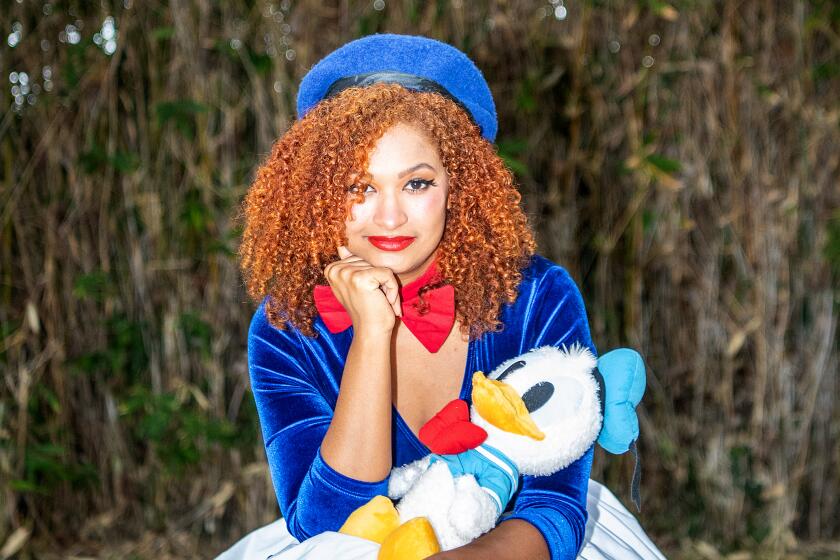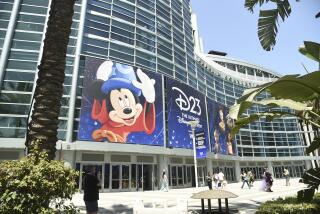Disneyland is more than a job for some workers. A wave of layoffs will hit Sunday
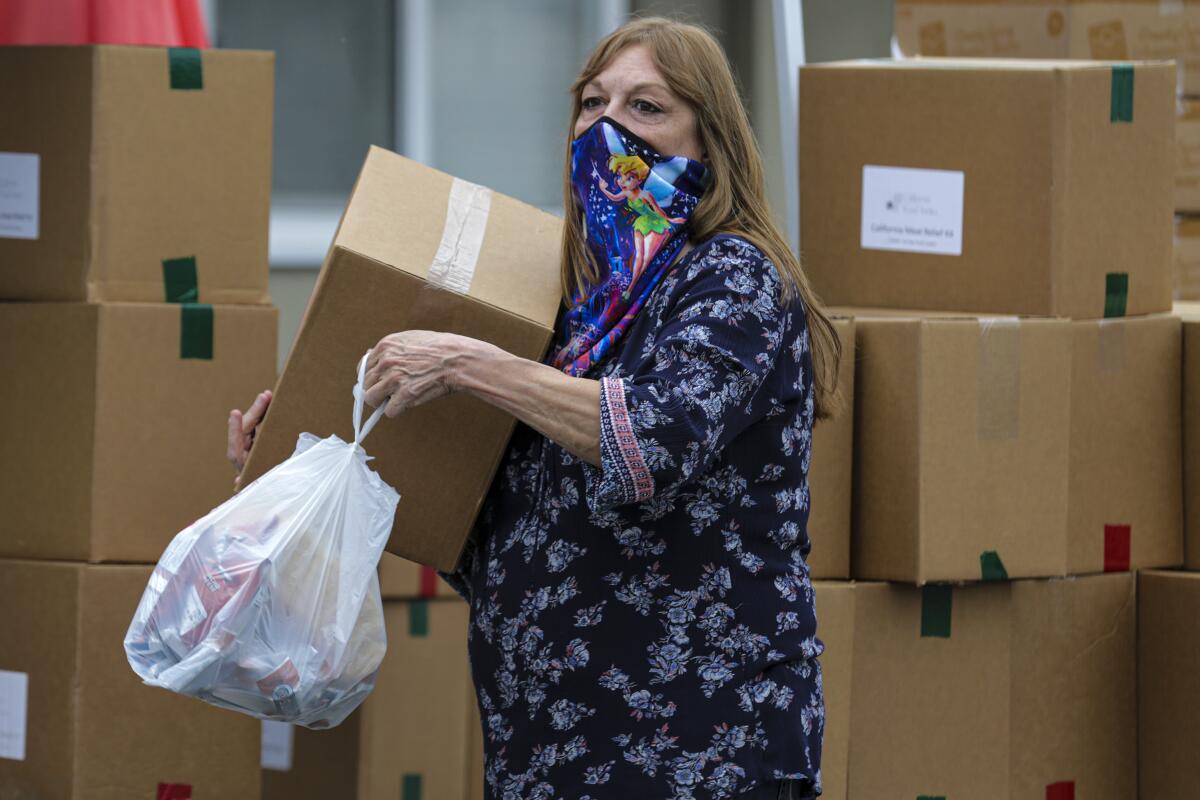
- Share via
Since she was furloughed from her job as a server and sommelier at a Disneyland Resort restaurant, Tina Thomas has struggled to cover her rent with her unemployment checks and is four months behind on her car payments.
On top of that, she is wrestling with dark feelings of loss of a workplace that to her felt more like a home. And then there is the anxiety about when she might return to the job she once hoped would carry her until retirement.
“I’m watching this roller coaster and hoping that it stops soon,” Thomas, 59, said of the last eight months of her life. “It’s so stressful to live this way.”
When California’s theme parks closed in March, employees of Disneyland, Universal Studios Hollywood and other parks were left in limbo, displaced from jobs through no fault of their own, with no idea when — or if — they would be called back.
The ax is about to fall on thousands of Disney workers. Walt Disney Co. plans to lay off 28,000 people across its theme parks and products and experience divisions, with about 10,000 of those layoffs hitting the Disneyland Resort parks, hotels and stores in Anaheim, according to company sources. Notifications for those layoffs are expected to reach workers via email by Sunday.
The loss of thrills, laughter and magic. Can Disneyland fanatics carry on without the “Happiest Place on Earth”?
Universal Studios Hollywood has already reduced its workforce by as many as 7,000 employees through furloughs, layoffs and cuts to work shifts.
The lucky ones have landed new gigs. Many others continue to collect unemployment checks, holding out hope that they will soon be called back to work alongside co-workers they consider family.
But the state has tied the reopening of the theme parks to getting a handle on the pandemic, making a reopening date difficult to predict.
Meanwhile, many theme park staffers are trying to cope with the depression and anxiety brought on by the uncertainty of their circumstances.
“Work was my escape. It was my outlet and I needed to do it,” said Priscilla Miranda, 30, a furloughed stage manager at Universal Studios Hollywood. “It was something that meant a lot for me. When it got taken away and I was home all the time, I got really depressed.”
About 135,000 people worked at California theme parks before the pandemic, and a huge number of them have been furloughed or laid off since March, when state officials recommended against large gatherings. Before they closed, the state’s parks were generating more than $12.6 billion in spending each year, much of it in Southern California, home to seven major theme parks.
Theme park workers in California earn an average annual salary of about $41,000. It’s perks such as free park passes for friends and family and exclusive previews of new attractions that make the jobs so desirable.
Park staffers also boast about the family-fun atmosphere and the close bonds they form with co-workers.
Soon after the parks closed, company officials hinted that they would reopen in time for the summer tourist season. But the pandemic didn’t abate quickly enough to allow that to happen. Now, state guidelines dictate that the largest theme parks won’t reopen until infection rates drop considerably in their home counties. An Orange County health official has said that means Disneyland probably won’t be able to open before summer 2021.
While theme park workers hold out hope that they will return to their park jobs someday, many have tried with little success to land other jobs.
“The industry is really shut down as far as live entertainment goes,” said Rob Siminoski, a furloughed stage manager at Universal Studios Hollywood who is now collecting unemployment checks and state funding for watching over his elderly mother.
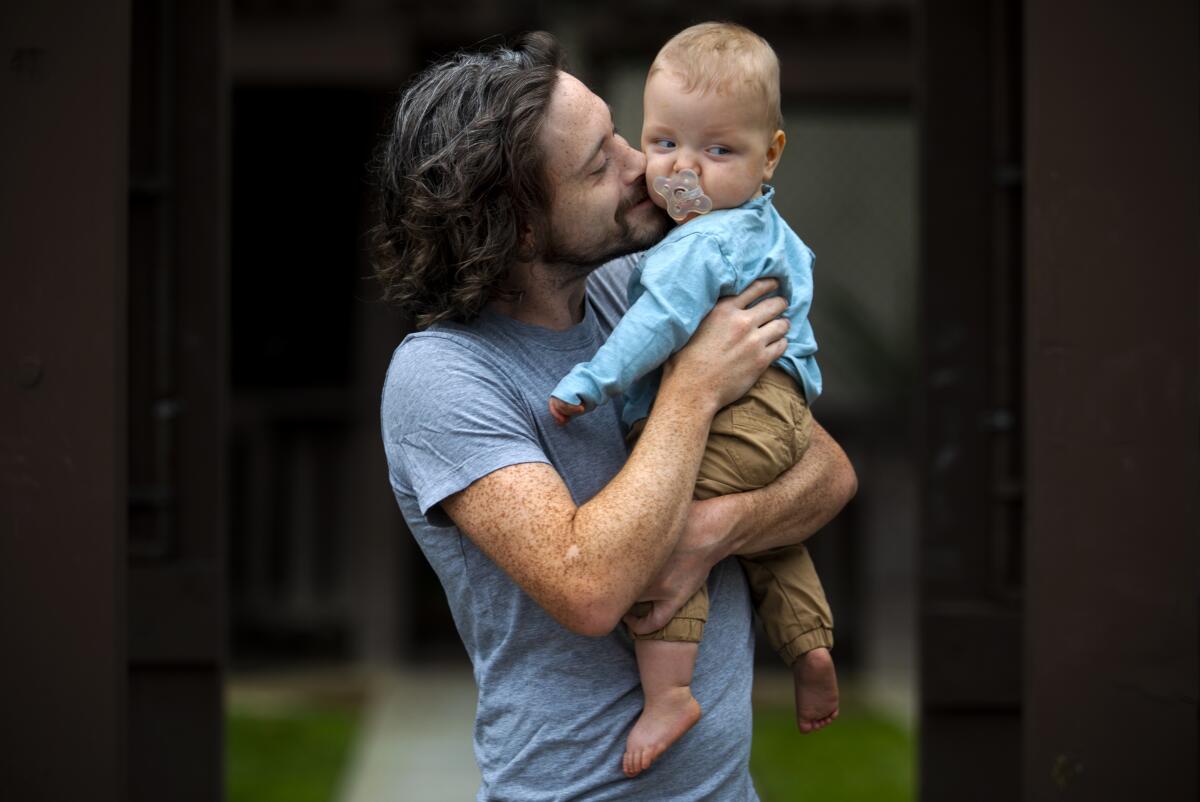
Theme park workers face the same emotions as other Americans who have been thrown out of work by the pandemic, according to mental health experts.
Our jobs often provide us with purpose and identity plus the companionship of co-workers who can understand the day-to-day heartaches that come with the work, said Vaile Wright, a clinical psychologist and senior director of healthcare innovation for the American Psychological Assn.
“Work is where we spend a majority of our time,” she said. “It gives us routine and structure.”
Wondering when the conditions will allow the parks to reopen adds to the feelings of depression and anxiety, Wright added.
“To have this level of uncertainty, that is what really drives negative emotions,” she said.
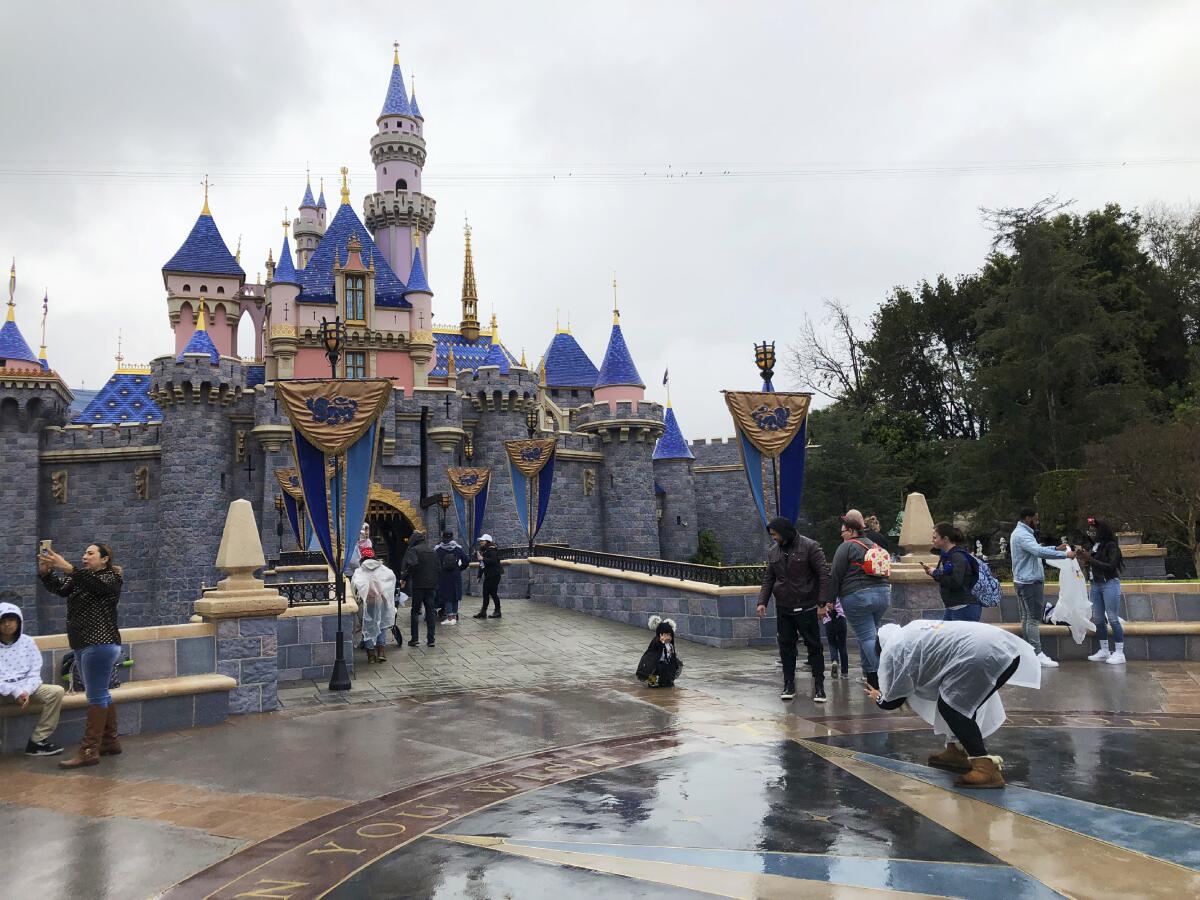
Cassie Simone and Josey Montana McCoy, cast members in the “Frozen” musical show at the Hyperion Theater in Disney California Adventure Park, learned this month that the show was canceled, with no plans to revive it when the park reopens.
The show, based on the animated feature film “Frozen,” opened at the theme park in 2016.
Simone, who has played the lead role of Anna in the show, had been acting in Disneyland stage performances since 2004. She called her time at the park a “dream job.”
She has become so close to her Disney co-workers that she has been a bridesmaid in the weddings of two fellow cast members and planned the baby shower of another.
“We’ve seen each other through marriages, babies, divorces, even deaths,” Simone said.
Since the show ended, she has landed a job as an office manager in a wellness clinic while taking auditions for commercials on the side. Simone now earns enough money to make ends meet, but she said she doesn’t feel like she’s the same person anymore.
“I’m having a real identity crisis because Disney was such a huge part of who I am,” she said, adding that much of her acting career has been at Disneyland. “Now I’m having to figure out who I am without Disney.”
Like most of her former Disney colleagues who spoke to The Times, Simone said she would return to the park if asked. She said she trusts Disney to adopt protocols to protect her, other performers and guests from the coronavirus.
McCoy, who played goofy snowman Olaf since the show started in 2016, has mixed feelings about the possibility of returning to Disney during the pandemic. He worries about catching the virus and infecting his baby.
“Let’s listen to the scientists,” he said.
McCoy recalls going onstage as Olaf when the show launched and realizing he was giving the children in the audience their first in-person depiction of the snowman. Now he is stunned to think he’ll never do that again.
“Emotionally, it comes in waves,” he said. “I realize that the wall of security that I built started to crumble slowly.”
McCoy credits his Disney co-workers for helping him cope. Within two days after his son’s premature birth, his “Frozen” castmates launched a Venmo account to raise money for food, breast pump cleaning supplies and other necessities.
“It was an incredibly overwhelming time, but our ‘Frozen’ friends were magnificent,” McCoy said.
He has taken online sessions to discuss his feelings of loss with a therapist and plays disc golf with “Frozen” castmates to pass the time. McCoy has looked into commercial acting jobs; he knows there are few, if any, gigs in his most preferred field, theater.
McCoy’s wife has a full-time job, so the young family has been able to pay its bills.
Other park workers are not so fortunate.
Miranda, the stage manager for the Universal Studios Hollywood “Waterworld” stunt show, was furloughed in May but, because of a glitch at the state Employment Development Department, did not receive unemployment checks until September.
She nearly emptied her savings account and struggled with feeling depressed.
“This was my career,” Miranda said. “It wasn’t just a job.”
She began to feel better after moving in with her parents in Rialto and started to receive the EDD money. But she’s not ready to put her Universal Studios job firmly in the past. She recalls being backstage at the “Waterworld” show, hearing the crowd roar, and feeling proud to help elicit such a reaction.
“I don’t want to feel like I’m giving up on it. It’s weird,” she said. “I feel like I would be a quitter if I turn away from it completely.”
Similarly, Thomas is reluctant to give up on her Disney job, saying she can’t imagine finding a position elsewhere with a tighter group of friends plus enough tips to generate between $200 and $1,000 per shift. She had worked at various restaurants in the Disneyland Resort since 2009, most recently at the Carthay Circle Restaurant at Disney California Adventure Park.
Thomas lives with one of her grown daughters and volunteers at a union-run food bank every other week. She also takes long walks on the beach near her home in Huntington Beach to tackle the stress and anxiety.
For Thomas, it’s the returning guests that made the job so special. Many customers would drop by her eatery year after year to greet her. After the park closed, she said, some parkgoers have contacted her at home to check in with her.
“I’ve watched their children grow and become regulars,” she said of her returning guests. “To me, that’s the best, and there aren’t many companies that we can grow that kind of relationship with.”
She still holds out hope for a Disney-worthy happily ever after, calling her current job status “a technicality.”
“Even with layoffs, at some point restrictions are going to ease,” she said. “They have to. I hope to retire from there. I have no interest in going anywhere else.”
More to Read
Inside the business of entertainment
The Wide Shot brings you news, analysis and insights on everything from streaming wars to production — and what it all means for the future.
You may occasionally receive promotional content from the Los Angeles Times.
